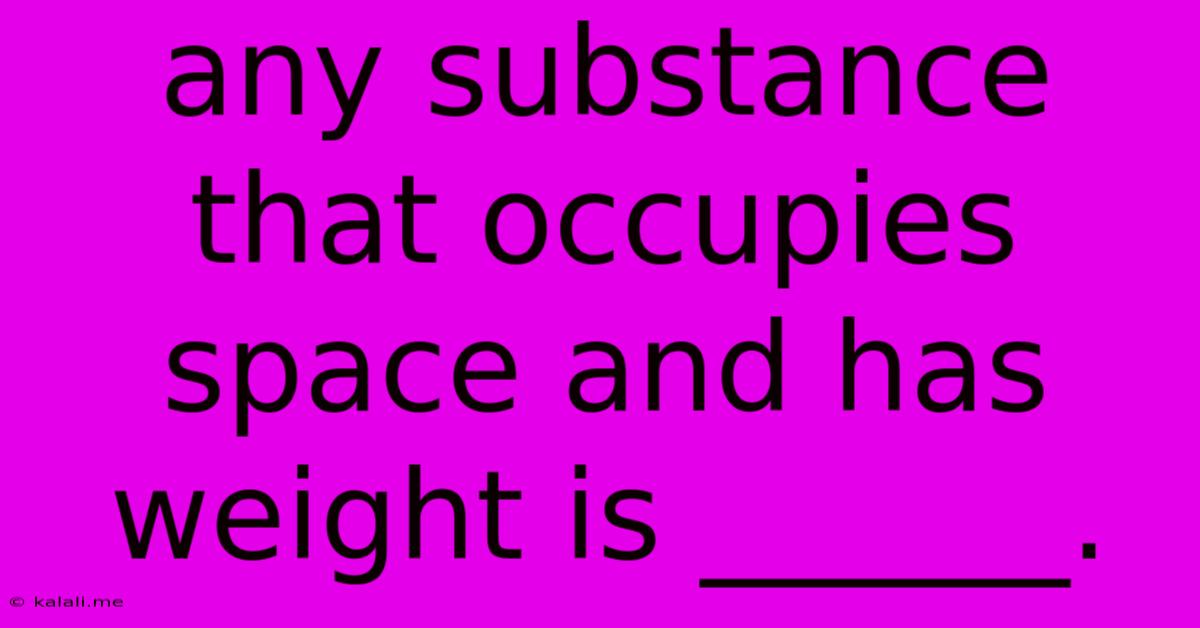Any Substance That Occupies Space And Has Weight Is ______.
Kalali
Jun 12, 2025 · 3 min read

Table of Contents
Any Substance That Occupies Space and Has Weight Is ______: Matter Defined
Meta Description: This article defines matter, exploring its properties, states, and the fundamental particles that compose it. Learn about the characteristics that distinguish matter from other forms of existence.
The answer to the question, "Any substance that occupies space and has weight is ______," is matter. Matter is a fundamental concept in physics and chemistry, representing anything that has mass and takes up space (volume). This seemingly simple definition encompasses a vast range of substances, from the smallest subatomic particles to the largest celestial bodies. Understanding matter is crucial to understanding the universe and everything within it.
Properties of Matter
Matter exhibits several key properties:
- Mass: A measure of the amount of matter in an object. This is often confused with weight, but weight is the force exerted on an object due to gravity. Mass remains constant regardless of location, while weight can vary.
- Volume: The amount of three-dimensional space occupied by an object.
- Density: The mass per unit volume of a substance. Dense materials have more mass packed into a given volume than less dense materials.
- Inertia: The resistance of an object to changes in its state of motion. Heavier objects have greater inertia and are harder to accelerate or decelerate.
- Compressibility: The ability of a substance to be squeezed into a smaller volume. Gases are highly compressible, while solids are generally much less so.
States of Matter
Matter exists in various states, the most common being:
- Solid: Solids have a definite shape and volume. Their particles are closely packed and have strong intermolecular forces. Examples include ice, rocks, and wood.
- Liquid: Liquids have a definite volume but take the shape of their container. Their particles are less closely packed than solids and have weaker intermolecular forces. Examples include water, oil, and mercury.
- Gas: Gases have neither a definite shape nor volume. Their particles are widely dispersed and have weak intermolecular forces. Examples include air, oxygen, and helium.
- Plasma: Plasma is a superheated state of matter where electrons are stripped from atoms, forming ions. It's often found in stars and lightning.
Beyond these common states, there are also other less familiar states of matter, such as Bose-Einstein condensates and fermionic condensates, which are observed at extremely low temperatures.
Composition of Matter
At the most fundamental level, matter is composed of atoms. Atoms themselves are made up of even smaller particles:
- Protons: Positively charged particles located in the atom's nucleus.
- Neutrons: Neutral particles located in the atom's nucleus.
- Electrons: Negatively charged particles orbiting the nucleus.
The arrangement and number of these subatomic particles determine the properties of an element. Different combinations of elements form molecules and compounds, creating the incredible diversity of substances we observe in the world around us.
Understanding the concept of matter and its properties is fundamental to numerous scientific disciplines, from physics and chemistry to biology and astronomy. It provides a framework for comprehending the composition, structure, and behavior of the universe and everything within it. The simple statement "Any substance that occupies space and has weight is matter" encapsulates a profound truth about the physical world.
Latest Posts
Latest Posts
-
Which Of The Following Are Only Found In Animal Cells
Jun 13, 2025
-
What Is Square Root Of 125
Jun 13, 2025
-
What Is Full Form Of Email
Jun 13, 2025
-
A 32 Bit Word Computer Can Access
Jun 13, 2025
-
Differentiate Between Subsistence Agriculture And Commercial Agriculture
Jun 13, 2025
Related Post
Thank you for visiting our website which covers about Any Substance That Occupies Space And Has Weight Is ______. . We hope the information provided has been useful to you. Feel free to contact us if you have any questions or need further assistance. See you next time and don't miss to bookmark.